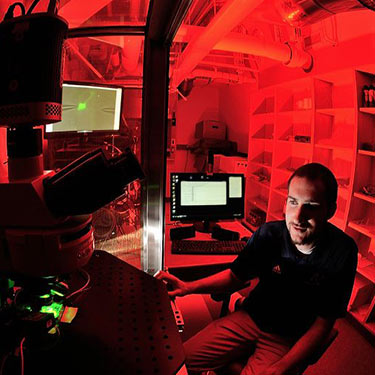Biology, M.S.
Master of Science in Biology
About the Degree
The master’s program in Biology offers students cutting-edge research opportunities in modern biological sciences. Areas of interest for graduate research include: aquatic ecology, behavioral evolution, biofilms, bioinformatics, biomaterials, biomechanics, biomedical research, comparative biochemistry, conservation biology, developmental molecular biology and physiology, evolutionary biomechanics, environmental microbiology, evolution in developmental processes, genomics, hypertension and stress research, life history evolution, mating systems, neurobiology, molecular phylogenetics, physiological ecology, and pollination biology.
Coursework combines core classes that provide broad training across the biological hierarchy – from molecules and cells to whole organisms to ecosystems and evolution – with smaller classes focused on specialized areas of research training. Most courses emphasize scientific inquiry and critical analysis of data.
Salary and Career Outlook
With the experiential learning of the MS degree, students are better prepared to enter the jobs market at a higher level of training. The broad course training prepares students within the program to pursue a wide array of jobs, ranging from healthcare to education and biomedical to biotechnology. The MS degree also positions students for further, advanced study in science and the healthcare professions.
Typical salaries in the biology field include:
- Pharmaceuticals $80,000
- Health care $80,000
- Environmental sciences $40,000-$75,000
- Conservation & Marine Biology $40,000-70,000
- Microbiologist $75,000-90,000
- Laboratory technician/manager $45,000-60,000
- Education $55,000-65,000
Why Akron?
The Biology department is in unique in its emphasis on cross-cutting research across multiple fields, from geology to polymer science. As a result of this interdisciplinary approach, students are exposed to some of the most cutting-edge research ongoing in their respective fields; whether testing thermodynamic theory on gecko foot pad adhesion or studying how microbial respiratory activity influences iron ore deposition in Brazil, students are trained to use techniques across multiple disciplines to address questions at the forefront of their field.
The Dr. Paul E. Martin Center for Field Studies and Environmental Education provides research facilities and onsite classroom on the 400 acre Bath Nature Preserve while students also take advantage of the 100 acre Panzer Wetland and both local Metroparks and the Cuyahoga Valley National Park for field courses and research.
We train our students how to conduct science in a very interdisciplinary environment that emphasizes interactions with their peers. This equips students to thrive in modern collaborative work and research spaces.
Graduated students from the program are in jobs such as:
- Animal Keeper for the National Zoo
- Systems-Based Testing in Genova Diagnostics
- Research Technician for Northeast Ohio Medical University
Contact Information
Contact Information:
Dr. Stephen Weeks, Department Chair
scw@uakron.edu
330-972-6954
Mary Samartgedes, Secretary
mary6@uakron.edu
330-972-7155

